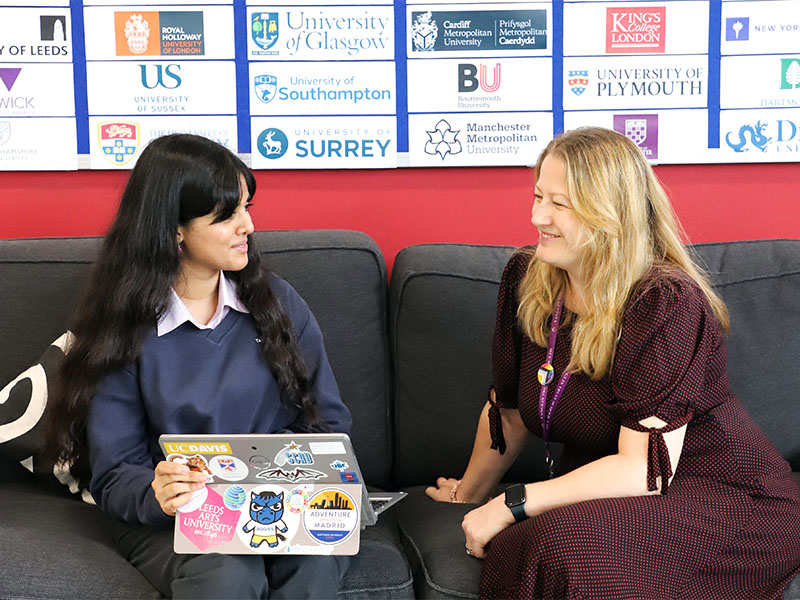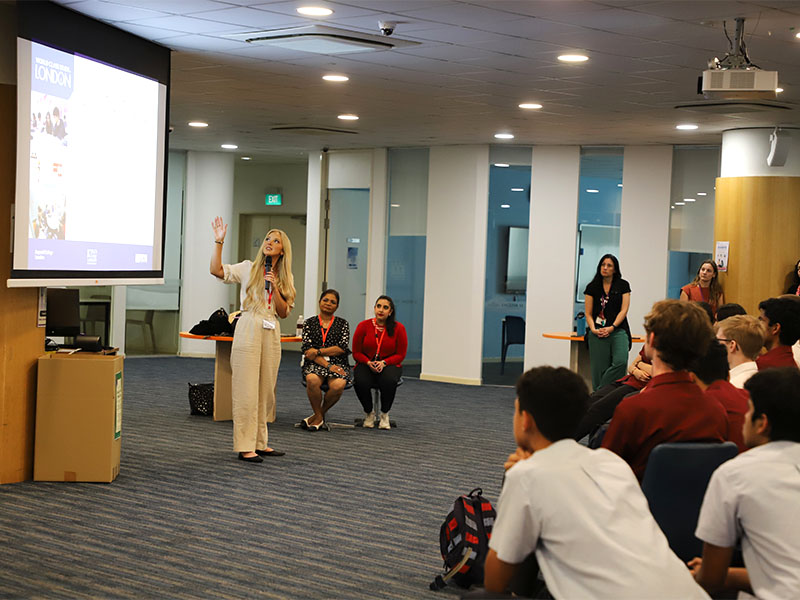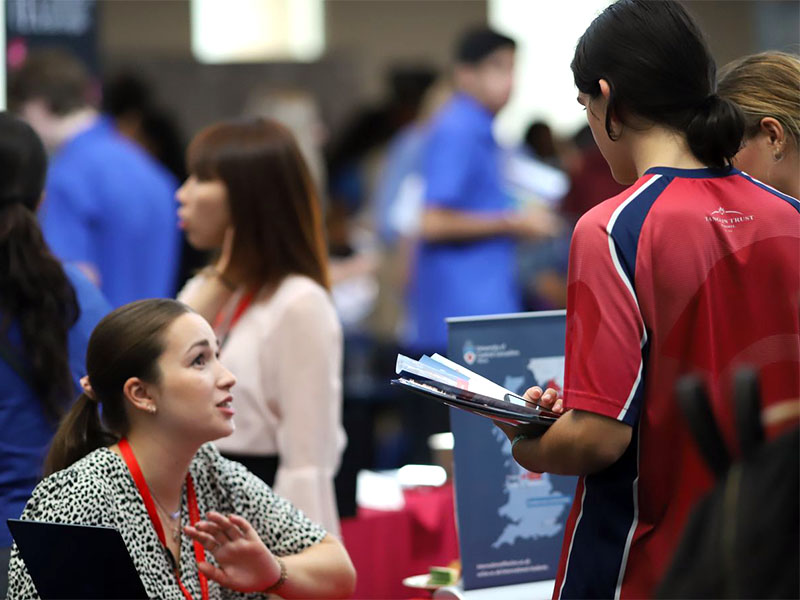Career guidance and help with university applications for students is so important. Support in this area can include organising university fairs and work experience opportunities and internships, careers counselling, and providing advice on choosing university courses and submitting applications. Here, we learn how high school students can benefit from the offerings at six Singapore international schools – plus, we get some tips from career guidance experts and a SAT prep institution in Singapore.
Tanglin Trust School
Tanglin Trust School believes that the university application process, like all experiences at the school, is an opportunity for learning and growth. They place the student at the centre of the decision-making process.
Tanglin’s University and Careers Counselling Department helps equip students with the skills and resources to confidently navigate their post-graduation plans. Headed by Zoë Williams and supported by a team of counsellors, the Department offers students bespoke counselling services including meetings and group workshops along with tutor times, assemblies and events. This comprehensive range of services is designed to empower students to find a personalised pathway that best suits their unique strengths, needs and goals. A range of practical skills are embedded in conjunction with the LifeSkills curriculum to help students prepare for interviews, write personal statements or prepare a portfolio of work depending on the entry requirements of their chosen universities.
Tips for parents
Zoë Williams, Head of University and Careers Counselling Department at Tanglin Trust School
- “The opportunity to explore work environments and gain hands-on experience is vital in providing insights and giving students ideas about potential future careers. Career guidance enriches a student’s understanding of the variety of potential pathways they can pursue and can also help shape their decisions when choosing their IB or A-level subjects.”
- “Getting involved in a CCA will develop a student’s confidence, self-esteem and collaboration skills. These are all vital life skills, which will also help your child to develop their CVs and college applications. Rather than pick a wide variety with little substance, they should pick activities that they’re genuinely interested in and will dedicate quality time to.”
- “Encourage your child to take ownership of their research and to be vigilant in terms of entry requirements for future courses in the Sixth Form or beyond at degree level. There are many opportunities for them to speak directly with institutions or employers. University fairs and college visitors are invaluable – they empower students with information, guidance and inspiration to make well-informed decisions about their future academic paths and firmly place the student at the centre of this journey.”
Hear from a parent
“Mrs Williams and her team of counsellors have been an outstanding source of help and support for both of my daughters and myself over the years as we navigated university applications. I can’t speak highly enough of the difference a knowledgeable, approachable and supportive guidance counsellor makes during stressful times.” – Clare C, Tanglin parent
95 Portsdown Road
6778 0771 | tts.edu.sg
UWC South East Asia
UWCSEA prepares its students for the world of work ahead in many ways through its holistic learning programme from K1 to 12 and with the guidance of the University Advising Centre (UAC) Advisors. Students in Grades 9 and 10 can choose from a wide variety of bespoke UWCSEA academic courses that cultivate a variety of skills and leadership styles. Grade 10 students have access to traineeships, extended internships and company visits through the UWCSEA Career Programme and the World of Learning course. These help inform their university applications and career choices. Based on the future career they wish to pursue and their university of choice, Grade 11 students carefully choose their IBDP subjects (including a new IB pilot course titled Systems Transformation: Leadership for Change, the first of its kind in South East Asia) for Grades 11 and 12 with the guidance and support of experienced UAC advisors.
During student mentor time and grade-level assemblies, students can access and explore resources and tools relevant to future studies and career options via Personal and Social Education (PSE). Through workshops and presentation sessions, UAC Advisors work together with students and parents to plan and consider different options such as university choices, completing National Service, embarking on a Gap Year or entering the workforce directly. Guidance provided by the UAC includes university research strategies, resume development, Careers in Focus events, one-on-one meetings, family consultations and interview preparation sessions.
An annual career guidance highlight is the cross-campus Careers Fair by the Parents’ Association. High School students and their parents come together with alumni and experts in a wide range of industries that have been identified by the UAC as relevant to student interests. High School students have benefitted from over 100 internships across 36 companies, year-round guidance from 1,500 mentor volunteers in the UWCSEA alumni network as well as exclusive company visits to industry leaders like Google, Amazon Web Services, Bytedance (TikTok), VISA and Razer, to name a few.
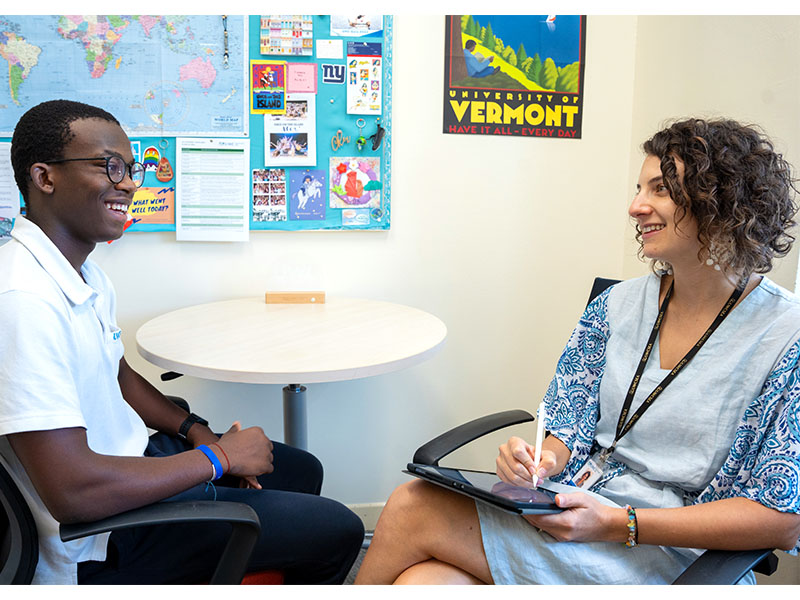
Tips for parents
Shruti and Pamela, Heads of University Advising at UWC South East Asia
- “As the process is an emotional one, approach it with sensitivity; be mindful of how you discuss universities and your child’s future.”
- “Encourage your child to understand that university outcomes are not the be-all and end-all of their life; there are many paths and many ways to reach the same destination. Emphasise the importance of building resilience and prioritising internal validation over external validation.”
- “Prepare your children for a rapidly evolving future by fostering adaptability and open-mindedness. The careers of their interest may not exist yet. Encourage them to view that as an opportunity to develop versatile skills that will prepare them for whatever comes their way.”
Hear from a graduate
“In High School, my class teachers cultivated an environment focused on individual exploration and creativity in science. This fuelled my interest in pursuing a science-focused career. I also had the freedom to explore areas of interest through local service, non-profit work and varsity sports, which clarified my career aspirations and areas for enacting change. My UAC advisor, Joan, was dedicated and offered invaluable guidance that helped me navigate IB course choices in Grade 10. While in Grades 11 and 12, she encouraged me to connect my interests as a potential career, guiding me in crucial application decisions and mapping out educational pathways to achieve that.” – Pranav, 2017 UWCSEA graduate, pursuing a Bachelors and Masters in Computer Science at Stanford University
Dover Campus: 1207 Dover Road | 6774 2653
East Campus: 1 Tampines Street 73 | 6305 5353
uwcsea.edu.sg
Dover Court International School
Dover Court’s university and career guidance team supports the school’s students before they even reach Sixth Form and their final two years of school. Involved already with the I/GCSE course options in Year 8, the school says the best career guidance counselling should start ahead of time. Students begin with a basic idea of what courses can help them with their end goals, if they have those defined. Once in Years 12 and 13, the school provides students with sharing sessions such as university visits as well as opportunities to virtually meet with universities and one-on-one meetings with the school’s guidance counsellor. This continues all through submitting university applications and as they receive decisions from universities.
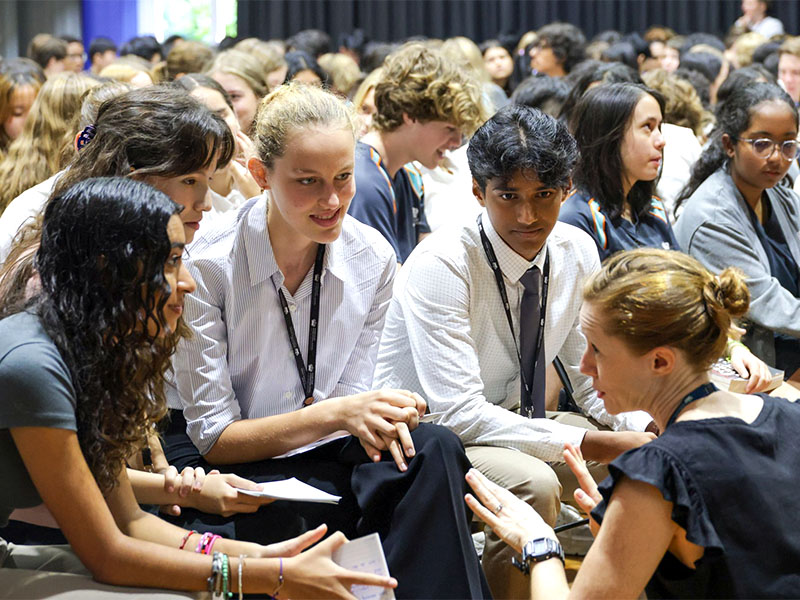
Tips for parents
Hani Rahman, Careers and Higher Education Guidance Counsellor at Dover Court International School
- “Encourage your child to be in the driver’s seat. If you have questions for teachers or universities, encourage and prepare your child to start asking the questions themselves. They’ll learn useful communication skills as well as develop pride in shaping their next steps. Universities always love chatting with excited students directly!”
- “Be a sounding board for your child and let them bounce all their new and wacky ideas off of you, and maybe add some of your own! Just because they have an idea at age 15, doesn’t mean they’ll necessarily jump into that as a career when they’re older. Who knows what interests may become hobbies, careers, or completely change over time but coming up with – and even later disregarding – ideas is part of the process.”
- “Plans often change or students don’t always know what they want for their next steps even though the best research and planning are done early. Universities are getting savvy to this, and some are changing to be more flexible on requirements, offering bridging courses and foundation programmes. Don’t worry if passions and plans change late in the process, that’s what your counsellor is there to help with.”
Hear from a student
“Dover Court has supported me throughout my university application process and decisions. Having a counsellor like Ms Rahman available, who can monitor the progress of my admissions and assist when writing my statements, has been incredibly helpful. Universities tend to have specific subject requirements and grades required and it’s always helpful to have an extra set of eyes to ensure that the universities are suited to you. The school also runs multiple university and career days throughout Sixth Form, which are very useful career guidance when finalising your career path.” – Soraya Shetty, Year 13 IBDP student
301 Dover Road
6775 7664 | dovercourt.edu.sg
Dulwich College (Singapore)
Dulwich offers a holistic, student-centred approach to career guidance through the engagement that the University Office has with students from Year 8 through to Year 13. The school’s university and careers counselling programme focuses on students’ strengths, interests, priorities and the world of work in Years 8 to 10. In Years 11 to 13, students are guided on understanding popular university systems throughout the world, personal essays and the vast array of specific opportunities in global markets for their university education. Additionally, students are taught how to evaluate and research a university’s ethos, values and curriculum to demonstrate informed interest and ensure best fit for them and their families.
The dedicated career guidance counselling sessions and engagement in the school’s extensive enrichment and CCA programme provides students with countless opportunities for personal student development and self-discovery. Such insight provides Dulwich educators with pertinent information needed to support students in setting goals and making sound decisions as they progress through the Senior School and IB, into the world of a personalised pathway to a university that really does offer them their ‘best fit’.

Tips for parents
Jo Mattingley & Nakul Malik, Co-Heads of University and Careers Counselling at Dulwich College (Singapore)
- “Engage in conversations about what factors – location, courses, style of learning, cost, social activities, environment, culture and so on – are important to you and your child when discussing post-secondary options.”
- “Give your child as much autonomy as possible through this process; the students who succeed the most at university are the ones who feel they have found their best fit.”
- “Start researching, planning and preparing early as balancing strong university applications along academics can be stressful. Create a timeline and plan to spread tasks out to ensure their overall wellbeing during this period.”
Hear from a student
“From encouraging informed IB subject choices as a new Year 12 student to providing detailed feedback on university application essays, DCSG’s University Counselling and Careers team has been instrumental in my academic journey. Thanks to the weekly guidance sessions and my counsellor’s dedicated support, I’ve found a university that suits my academic and extracurricular needs. I couldn’t have asked for a more reliable support system!” – Shishir Bhatt, Class of 2024
71 Bukit Batok West Avenue 8
6890 1000 | singapore.dulwich.org
GESS – International School
The university and careers counselling team of GESS has been partnering many corporate and educational entities to organise mock interviews, university fairs and more. The team is also the trusted go-to for GESS students looking for guidance. The school will be investing more resources into a new career and university counselling centre and adopting data-driven insights to guide families on school and course selection. These initiatives will help students make better and more informed decisions about their future. They will also pave the way for even more partners, such as top global universities desired by GESS students and parents, to join their network. Career guidance services will also be extended to Grade 8 students, giving them an earlier head start in considering their future possibilities.
The school’s award-winning BeyondClassrooms programme creates internships, site visits, industry and career talks, workshops, social activities and deployment at events by partners and the government. By connecting students with purposeful out-of-school experiences, they’re empowered to explore and cultivate interests, talents and possibilities. GESS says this then steers students towards more possibilities and better decisions for the future.
Through the GESS Alumni Programme, students and graduates benefit from the experiences, insights and connections of former students and staff. Alumni also generously share their university-related knowledge and expertise through the school’s University Mentorship Programme.
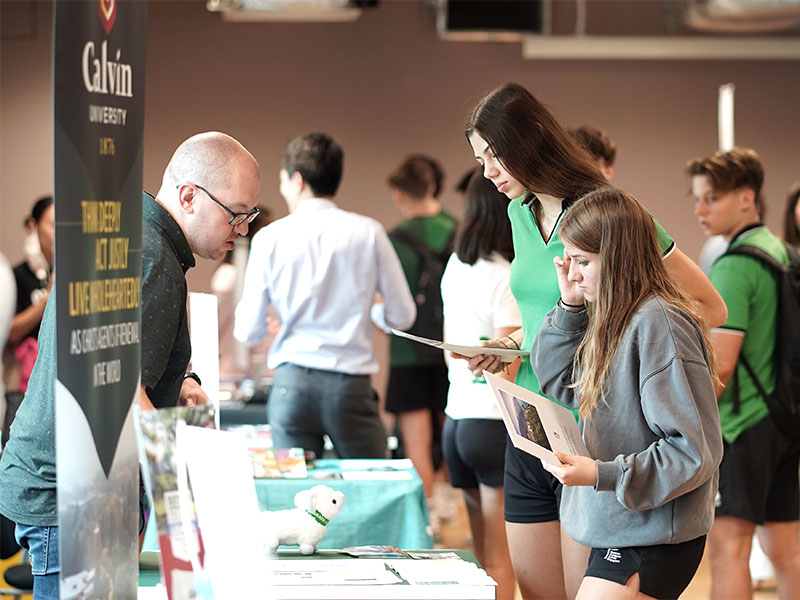
Tips for parents
Mariola Meyer, University Guidance and Careers Counsellor at GESS International School
- “Encourage children to take risks and not be afraid to fail. Failure is a natural part of the learning process, and it can often lead to growth and success.”
- “Encourage graduating students to be open to new opportunities and be willing to try new things, even if these are outside their comfort zone.”
- “Instil in children the importance of networking to build relationships and make connections in the industry or field they want to pursue. Students can optimise opportunities created by GESS to meet and learn from experienced professionals in their desired field.”
Hear from a student
“Applying to universities is always stressful but the university guidance counsellors at GESS have facilitated as smooth a pathway as possible for me. I was assisted in various application requirements and deadlines. The counsellors also created a personalised experience for each student and are ready to help at all hours of the day, making the process much easier and less frightening. I particularly enjoy the biweekly university guidance lessons, where we learn all about university life and general life skills such as financing and adapting to new environments. These skills and the support provided by the counsellors have made me feel much more prepared and ready for life after high school.” – Linda Jaschik, Grade 12
2 Dairy Farm Lane
6461 0801 | gess.edu.sg
Nexus International School (Singapore)
Nexus’s Careers and University Programme for Years 9 to 13 is delivered by the Careers and University Counsellor, IB Coordinator, Phase Leaders and Tutor Teachers. The school utilises Unifrog, a digital platform, across these year groups to enable learners to make informed decisions about life after Nexus.
In Year 9, the programme involves getting learners to focus on themselves as individuals, and on their skills and interests. This foundation is built on in Year 10, with discussions around aspirations for the future. They’re supported by a series of psychometric tests and quizzes that serve as a foundation for the NexSteps Career Programme. Learners also practise writing a strong supporting statement and experience mock job interviews.
Year 12 learners have a tailored series of sessions exploring destinations and university application requirements. They prepare for life after Nexus by writing college essays, experiencing practice interviews and how to write a strong CV. In their final term, they start weekly one-on-one sessions with the guidance counsellor. These continue to Year 13. Learners in their last year at Nexus are supported in their final decision making and with their applications.
Once a year, the school runs the NexSteps Future Readiness Career Fair, which features big companies like Apple and CIMB. This enables learners to find out about the careers available. They also receive feedback and learn interview tips for professionals through practising a formal interview with representatives from these companies.

Tips for parents
Aine Massey, Careers and University Counsellor at Nexus International School (Singapore)
- “Engage in casual conversations about your child’s favourite subjects, strengths and weaknesses, aspirations etc. from a young age. Think dinner table chats or weekend walks to get the ball rolling.”
- “While it’s natural for parents to worry, allow your child autonomy to make their own decisions about their future. Encourage them to take every opportunity available to them to reflect on their academic strengths and support independent decision making and planning for their future.”
- “Use the Unifrog platform to explore possible career pathways, university destinations and course options open to your child. There are also a whole range of seminars, workshops and Massive Online Open Courses to take advantage of.”
Hear from a student
“Ms Aine offered great guidance in exploring university options and was always supportive and encouraging of my aspirations. You can see her passion in wanting to help build a pathway to your future. The IB curriculum offered the foundation to feel prepared for university through developing essay skills, self-directed study and enhancing subject specific knowledge. I’m grateful for the support from Mr Massey and Ms Aine throughout the process.” – Chiara, Class of 2022, studying Sport Science: Exercise Prescription in New Zealand
1 Aljunied Walk
6536 6566 | nexus.edu.sg
Testtakers
Hear from a SAT prep institution in Singapore regarding testing for American university applications
“Since COVID, nearly every American university has adopted a ‘test optional’ admissions policy and stopped requiring the SAT/ACT tests. As test centres were largely shut, schools couldn’t require a test that students were unable to take. University applications to the most competitive schools skyrocketed. Students were convinced that they would have a chance at schools X, Y, and Z since they didn’t need to share their relatively middling test scores.
Universities have been enjoying this surge, with the direct results being lower admit rates and higher university application fee revenues. Behind the headlines, the overwhelming majority of students admitted to the most competitive schools still submit SAT/ACT scores. Among the top 20 schools with stated test optional policies, it was nearly 70% in the last cycle. Shouldn’t it really be ‘test preferred’ then?

On 5 February 2024, Dartmouth became the first Ivy League school to reinstate the SAT/ACT requirement. It joins MIT, Georgetown and the Florida and Georgia public schools. Through a careful analysis, Dartmouth determined that many economically disadvantaged applicants who didn’t submit test scores were being rejected. Had they submitted scores, they would have been considered in the context of their background and likely admitted. After Dartmouth, Yale (22 February), Brown (5 March) and UT Austin (11 March) followed with similar policy announcements. More schools will follow.” – Jeremy Craig
4th Floor, 271 Bukit Timah Road, Balmoral Road
6728 7476 | testtakers-sg.com
Read more about university applications and careers counselling in Singapore and more schools information in our Living in Singapore section.

